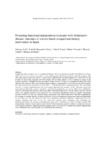Mostrar el registro sencillo del ítem
Promoting Functional Independence in People with Alzheimer's Disease: Outcomes of a Home‐Based Occupational Therapy Intervention in Spain
| dc.contributor.author | Ávila Álvarez, Adriana I. | |
| dc.contributor.author | De-Rosende, Iván | |
| dc.contributor.author | Torres-Tobío, Gabriel | |
| dc.contributor.author | Vizcaíno, Miriam | |
| dc.contributor.author | Peralbo, Manuel | |
| dc.contributor.author | Durán-Bouza, Montserrat | |
| dc.date.accessioned | 2019-01-18T11:49:35Z | |
| dc.date.issued | 2018-07-11 | |
| dc.identifier.citation | Ávila A, De-Rosende-Celeiro I, Torres G, et al. Promoting functional independence in people with Alzheimer's disease: outcomes of a home‐based occupational therapy intervention in Spain. Health Soc Care Community. 2018; 26(5): 734-743 | es_ES |
| dc.identifier.issn | 0966-0410 | |
| dc.identifier.uri | http://hdl.handle.net/2183/21605 | |
| dc.description.abstract | [Abstract] Nonpharmacologic therapies such as occupational therapy (OT) are promising for people with Alzheimer's disease (AD). However, more research is needed to better understand the effectiveness of home-based OT programs. This pilot study aimed to assess the effects of a home-based, high-intensity and multicomponent OT intervention on the activities of daily living of people with AD in Spain. The secondary objective was to examine its impact on the cognitive functions. A multiple-baseline intrasubject design was used. Twenty-one community-dwelling older adults with mild AD (mean age 78.6 years) and their primary caregivers participated in a 12-week home-based OT program. This intervention was replicated for 8 weeks after a 1.5-month intervention withdrawal period. The intervention followed a holistic, biopsychosocial and client-centred approach and consisted of the following components: meaningful activities/tasks, cognitive stimulation, activation of psychomotor and sensory skills, home modification, caregiver counselling and training in daily living skills. Functional independence was the primary outcome (Barthel Index). The cognitive functions were assessed by the Loewenstein Occupational Therapy Cognitive Assessment-Geriatric (LOTCA-G). Data were analysed using nonparametric tests. Main results showed that after completing the OT program, 6.5 months after the moment of inclusion, the level of functional independence improved significantly and the effect size was large. Moreover, there was a significant moderate-to-substantial improvement in several cognitive functions after each of the two intervention periods: place orientation, time orientation and attention/concentration. In summary, the findings give a great deal of information as a basis for further research. This study provides evidence that an intensive home-based OT intervention has a positive influence on daily activities and some cognitive functions, suggesting that this program may be beneficial as a nonpharmacological supplementary tool in health and social care for people with AD living in the community. | es_ES |
| dc.language.iso | eng | es_ES |
| dc.publisher | Wiley | es_ES |
| dc.relation.uri | https://doi.org/10.1111/hsc.12594 | es_ES |
| dc.rights | This is the peer reviewed version of the article which has been published in final form at Wiley Online Library. This article may be used for non commercial purposes in accordance with Wiley Terms and Condiitions for self-archiving. | es_ES |
| dc.subject | Alzheimer's disease | es_ES |
| dc.subject | Activities of daily living | es_ES |
| dc.subject | Cognition | es_ES |
| dc.subject | Occupational therapy | es_ES |
| dc.subject | Treatment outcome | es_ES |
| dc.title | Promoting Functional Independence in People with Alzheimer's Disease: Outcomes of a Home‐Based Occupational Therapy Intervention in Spain | es_ES |
| dc.type | info:eu-repo/semantics/article | es_ES |
| dc.rights.access | info:eu-repo/semantics/openAccess | es_ES |
| dc.date.embargoEndDate | 2019-07-11 | es_ES |
| dc.date.embargoLift | 2019-07-11 | |
| UDC.journalTitle | Health & Social Care in the Community | es_ES |
| UDC.volume | 26 | es_ES |
| UDC.issue | 5 | es_ES |
| UDC.startPage | 734 | es_ES |
| UDC.endPage | 743 | es_ES |
Ficheros en el ítem
Este ítem aparece en la(s) siguiente(s) colección(ones)
-
UI-TOINF - Artigos [18]






